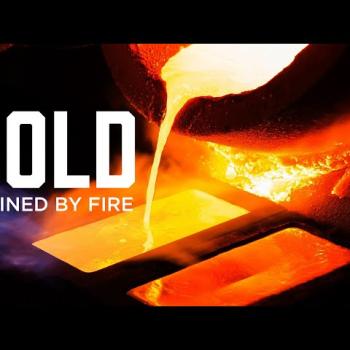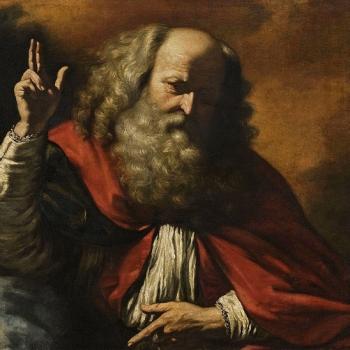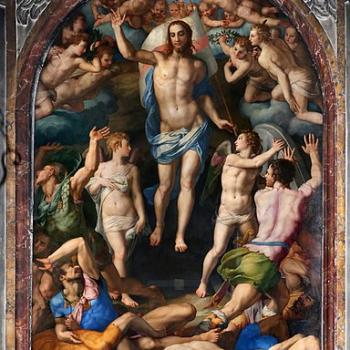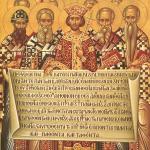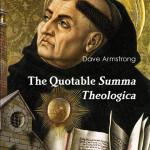Also: Biblical Evidence Against Monothelitism (Denial of Jesus’ Possession of Both Human and Divine Wills)
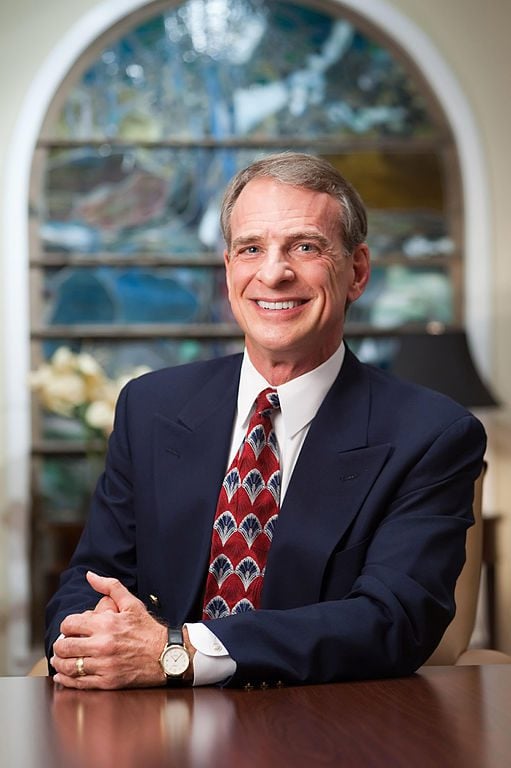
For lengthy historical and theological background information, see: Catholic Encyclopedia: “Monothelitism and Monothelites,” written by John Chapman. Monothelitism was condemned as Christological heresy by the sixth ecumenical council at Constantinople, in 680-681. Pope Leo II confirmed (in 683) the conciliar decrees against the heresy.
Today, my attention was directed to a piece written by prominent Protestant philosopher and apologist, Dr. William Lane Craig: a very able defender of theism over against atheism, and expert, particularly, on the cosmological argument (my own favorite theistic argument). He openly espoused Monothelitism in response to a question at his website. Dr. Craig wrote in the first paragraph of his reply (9-21-08):
No earnest Christian wants to be considered a heretic. But we Protestants recognize Scripture alone as our ultimate rule of faith (the Reformation principle of sola scriptura). Therefore, we bring even the statements of Ecumenical Councils before the bar of Scripture. While one disagrees with the promulgations of an Ecumenical Council only with great hesitancy, nonetheless, since we do not regard these as invested with divine authority, we are open to the possibility that they have erred in places. It seems to me that in condemning Monotheletism as incompatible with Christian belief the Church did overstep its bounds.
Fair enough. I understand sola Scriptura and the Protestant conception of the rule of faith: as expressed above. I’ve written about it and debated it (by far) more times than anything else I have done [including two books about it]. Dr. Craig did not, however (unfortunately and ironically), provide even a single Bible passage in his reply, to back up his case. If he appeals to the principle of sola Scriptura, it would seem sensible that he would try to produce at least some Scripture in favor of his position, since he specifically has appealed to Scripture over against ecumenical councils.
This is the classic Protestant approach: first exemplied by Martin Luther in his statements at the Diet of Worms in 1521: appealing to Scripture Alone and asserting that Church councils err and contradict each other.
If Dr. Craig and Protestants generally speaking “are open to the possibility that they [ecumenical councils] have erred in places,” then presumably they should also be open to the possibility that their own biblical interpretations also could quite possibly err. I think this is one such instance. What does Scripture say in the first place, about it? The sola Scriptura Protestant gave no argument one way or the other from the Bible. But this Bible-loving, “biblical evidence-oriented” Catholic apologist thinks that Scripture has a great deal to say on the matter: and it entirely backs up infallible Catholic christological tradition.
Jesus distinguishes His human will from His Divine Will, but completely subordinates the former to the latter. According to Ludwig Ott in Fundamentals of Catholic Dogma (p. 148), here are the scriptural proofs of the orthodox Catholic (and mainstream Protestant) position (with one or two of my own added):
Matthew 26:39 (RSV) And going a little farther he fell on his face and prayed, “My Father, if it be possible, let this cup pass from me; nevertheless, not as I will, but as thou wilt.”
Luke 22:42 “Father, if thou art willing, remove this cup from me; nevertheless not my will, but thine, be done.”
John 5:30 I can do nothing on my own authority; as I hear, I judge; and my judgment is just, because I seek not my own will but the will of him who sent me.
John 6:38 For I have come down from heaven, not to do my own will, but the will of him who sent me;
Other passages presuppose a human will:
John 4:34 Jesus said to them, “My food is to do the will of him who sent me, and to accomplish his work.
John 5:19 Jesus said to them, “Truly, truly, I say to you, the Son can do nothing of his own accord, but only what he sees the Father doing; for whatever he does, that the Son does likewise.
John 8:29 And he who sent me is with me; he has not left me alone, for I always do what is pleasing to him.
John 14:31 but I do as the Father has commanded me, so that the world may know that I love the Father.
Romans 5:19 For as by one man’s disobedience many were made sinners, so by one man’s obedience many will be made righteous.
Philippians 2:8 And being found in human form he humbled himself and became obedient unto death, even death on a cross.
Hebrews 10:9 then he added, “Lo, I have come to do thy will.” . . .
The freedom of choice of Christ’s human will is demonstrated:
John 10:18 No one takes it from me, but I lay it down of my own accord. I have power to lay it down, and I have power to take it again; this charge I have received from my Father.”
Jesus conceptually distinguishes the Father’s will from his own (these are all further proofs of my own, that Dr. Ott did not cite):
Matthew 7:21 “Not every one who says to me, ‘Lord, Lord,’ shall enter the kingdom of heaven, but he who does the will of my Father who is in heaven.
Matthew 12:50 For whoever does the will of my Father in heaven is my brother, and sister, and mother. (cf. Mk 3:35)
Matthew 18:14 So it is not the will of my Father who is in heaven that one of these little ones should perish.
John 6:39-40 and this is the will of him who sent me, that I should lose nothing of all that he has given me, but raise it up at the last day. [40] For this is the will of my Father, that every one who sees the Son and believes in him should have eternal life; and I will raise him up at the last day.
Many other passages show that Jesus’ human will always agreed with His (and the Father’s) Divine Will:
John 5:17 But Jesus answered them, “My Father is working still, and I am working.”
John 8:28 So Jesus said, “When you have lifted up the Son of man, then you will know that I am he, and that I do nothing on my own authority but speak thus as the Father taught me.
John 10:28-30 and I give them eternal life, and they shall never perish, and no one shall snatch them out of my hand. [29] My Father, who has given them to me, is greater than all, and no one is able to snatch them out of the Father’s hand. [30] I and the Father are one.
John 10:37-38 If I am not doing the works of my Father, then do not believe me; [38] but if I do them, even though you do not believe me, believe the works, that you may know and understand that the Father is in me and I am in the Father.
John 12:44-45 And Jesus cried out and said, “He who believes in me, believes not in me but in him who sent me. [45] And he who sees me sees him who sent me.
John 14:7-10 If you had known me, you would have known my Father also; henceforth you know him and have seen him.” [8] Philip said to him, “Lord, show us the Father, and we shall be satisfied.” [9] Jesus said to him, “Have I been with you so long, and yet you do not know me, Philip? He who has seen me has seen the Father; how can you say, `Show us the Father’? [10] Do you not believe that I am in the Father and the Father in me? The words that I say to you I do not speak on my own authority; but the Father who dwells in me does his works.
John 16:15 All that the Father has is mine; therefore I said that he will take what is mine and declare it to you.
Colossians 1:15-19 He is the image of the invisible God, the first-born of all creation; [16] for in him all things were created, in heaven and on earth, visible and invisible, whether thrones or dominions or principalities or authorities — all things were created through him and for him. [17] He is before all things, and in him all things hold together. [18] He is the head of the body, the church; he is the beginning, the first-born from the dead, that in everything he might be pre-eminent. [19] For in him all the fulness of God was pleased to dwell,
Hebrews 1:2-3 but in these last days he has spoken to us by a Son, whom he appointed the heir of all things, through whom also he created the world. [3] He reflects the glory of God and bears the very stamp of his nature, upholding the universe by his word of power. When he had made purification for sins, he sat down at the right hand of the Majesty on high,
So the bottom line is that Jesus possessed two wills: a human will and a Divine Will. These are distinguished in Scripture but they always agreed in everything. The fact that they agree does not wipe out the fact that they are conceptually distinct. The Father, Son, and Holy Spirit are distinct, too. It doesn’t follow that there are not Three Persons in the Godhead because they always agree with each other and are one in essence. They refer to each other as Subject and Object.
Likewise, Jesus’ two wills do not become one simply because they always agree. Nor does it imply that Jesus is two persons because He has two wills, anymore than it is implied that He is two persons because He has Two Natures (a doctrine that Dr. Craig himself accepts).
***
William Lane Craig has been one of the most notable philosophers who defends theism against atheism. Yet (very sadly, as I, like many others, have enjoyed his work) he is indeed a heretic, from the perspective of historic Christianity; on three very serious counts:
1) He denies that Jesus has two wills, which is the heresy of monothelitism.
2) He denies that God is outside of time after the creation (writing, “God ought to be considered as timeless sans creation and temporal subsequent to creation.”: “God, Time, and Eternity”). That is rank heresy, too, because it means that God can change, which violates the dogma of His immutability.
3) He denies that Jesus is eternally begotten of the Father, which is a denial of what is called the monarchia or principatus of the Father — meaning that the Father is not “begotten”; the Son is, and the Holy Spirit also proceeds from the Father and the Son (filioque).
He writes:
Theologically, it seems to me, the doctrine of the generation of the Logos from the Father cannot, despite assurances to the contrary, but diminish the status of the Son because He becomes an effect contingent upon the Father. Even if this eternal procession takes place necessarily and apart from the Father’s will, the Son is less than the Father because the Father alone exists in Himself, whereas the Son exists through another. Such derivative being is the same way in which created things exist. Despite protestations to the contrary, Nicene orthodoxy does not seem to have completely exorcised the spirit of subordinationism introduced into Christology by the Greek Apologists. For these reasons evangelical theologians have tended to treat the doctrine of the eternal generation of the Son from the Father with benign neglect. (“Is God the Father Causally Prior to the Son?”, 10-22-07)
These are all dogmas of the Catholic faith (agreed to by many if not most Protestants as well), but, true to form according to the evangelical rule of faith, Dr. Craig appeals to his own (heretical) interpretation of Scripture, which for him trumps any apostolic tradition of the Church; thumbing his nose even at “Nicene orthodoxy.” It’s a prime example of how sola Scriptura can easily lead to heresy: even very serious heresy involving the theology of God: theology proper, and Christology. This is what can and in fact, does happen by denying the infallibility of the Church and ecumenical councils.
***
Protestants say heresy is a view in direct denial of clear teaching of Scripture. In many cases, they are correct (in applying Scripture properly against heresy), but in others (as seen here), it breaks down. Of course, the rub is, “what is the clear teaching of Scripture?” Again, in many areas, Protestants can agree, but in many they disagree, so that sola Scriptura is unworkable in practice, and ultimately logically circular, as I have demonstrated times without number in my writing.
Infallible Church authority is the only [ultimate] way out of the conundrum. According to Scripture (1 Tim 3:15, Jerusalem Council, guidance of the Holy Spirit), God intended that there be an authoritative, infallible Church so that the truth can be known with certainty. That was how He planned it. We can either accept God’s plan or reject it and set up traditions of men.
We have seen where the latter have led, in Protestantism: endless self-contradiction and ecclesiological chaos, and to a weird adherence to what I have called “the cult of uncertainty.”
Plenty of Protestants would disagree with Craig on these points of Christology and the theology of God. . It’s a mixed bag, as always. This stuff derives from liberal theology, which was a development of the late 18th century: not from the beginning of Protestantism.
Ludwig Ott says (with no ambiguity or confusion at all, or lack of definitiveness):
God is absolutely immutable. (De fide.)
The 4th Lateran Council and the Vatican Council teach that God is immutable (incommutabilis) D 428, 1782. Holy Scripture excludes all change from God and positively ascribes to Him absolute immutability . . .
The Fathers exclude all change from God . . .
St. Thomas bases the absolute immutability of God on His pure actuality, on His absolute simplicity and on His infinite perfection . . . (pp. 35-36)
More magisterial sources:
LATERAN COUNCIL IV 1215
Ecumenical XII (against the Albigensians, Joachim, Waldensians etc.
The Trinity, Sacraments, Canonical Mission, etc.*
Chap. 1. The Catholic Faith
(Definition directed against the Albigensians and other heretics]
428 Firmly we believe and we confess simply that the true God is one alone, eternal, immense, and unchangeable, incomprehensible, omnipotent and ineffable, Father and Son and Holy Spirit: indeed three Persons but one essence, substance, or nature entirely simple. The Father from no one, the Son from the Father only, and the Holy Spirit equally from both; without beginning, always, and without end; the Father generating, the Son being born, and the Holy Spirit proceeding; consubstantial and coequal and omnipotent and coeternal; one beginning of all, creator of all visible and invisible things, of the spiritual and of the corporal; who by His own omnipotent power at once from the beginning of time created each creature from nothing, spiritual, and corporal, namely, angelic and mundane, and finally the human, constituted as it were, alike of the spirit and the body. For the devil and other demons were created by God good in nature, but they themselves through themselves have become wicked. But man sinned at the suggestion of the devil. This Holy Trinity according to common essence undivided, and according to personal properties distinct, granted the doctrine of salvation to the human race, first through Moses and the holy prophets and his other servants according to the most methodical disposition of the time.
THE VATICAN COUNCIL 1869-1870
Ecumenical XX (on Faith and the Church)
SESSION III (April 24, 1870)
Dogmatic Constitution concerning the Catholic Faith *
Chap. 1. God, Creator of All Things
1782 [The one, living, and true God and His distinction from all things.] * The holy, Catholic, Apostolic, Roman Church believes and confesses that there is one, true, living God, Creator and Lord of heaven and earth, omnipotent, eternal, immense, incomprehensible, infinite in intellect and will, and in every perfection; who, although He is one, singular, altogether simple and unchangeable spiritual substance, must be proclaimed distinct in reality and essence from the world; most blessed in Himself and of Himself, and ineffably most high above all things which are or can be conceived outside Himself [can. 1-4].
If God can’t change, He can’t and doesn’t change. It’s not rocket science. There are no degrees to that; there are no gradations or variation. He can’t change because He’s an absolutely perfect Being.
Now, what sense does it make to posit a “weak immutability”? Where does that come from in Scripture or in Church councils? Of course, any number of false ideas can come from philosophy, because it is disconnected from theology, the queen of the sciences. Philosophers today don’t have to synthesize their thinking with revelation and tradition and dogma.
So we get lots of false notions, including the ones from Craig above: and open theism and process theology that are currently trendy as heck and oh-so-fashionable.
The Catholic Encyclopedia (“The Nature and Attributes of God”):
When we say that God is infinite, we mean that He is unlimited in every kind of perfection or that every conceivable perfection belongs to Him in the highest conceivable way. . . .
Immutability
In God “there is no change, nor shadow of alteration” (James 1:17); “They [i.e. “the works of thy hands”] shall perish, but thou shalt continue: and they shall all grow old as a garment. And as a vesture shalt thou change them, and they shall be changed: but thou art the selfsame and thy years shall not fail” (Hebrews 1:10-12, Psalm 101:26-28. Cf. Malachi 3:6; Hebrews 13:8). These are some of the Scriptural texts which clearly teach Divine immutability or unchangeableness, and this attribute is likewise emphasized in church teaching, as by the Council of Nicaea against the Arians, who attributed mutability to the Logos (Denzinger, 54-old No. 18), and by the Vatican Council in its famous definition.
That the Divine nature is essentially immutable, or incapable of any internal change, is an obvious corollary from Divine infinity. Changeableness implies the capacity for increase or diminution of perfection, that is, it implies finiteness and imperfection. But God is infinitely perfect and is necessarily what He is. . . .
Did the Incarnation affect God’s immutability, though? No:
It is to be remembered that, when the Word took Flesh, there was no change in the Word; all the change was in the Flesh. At the moment of conception, in the womb of the Blessed Mother, through the forcefulness of God’s activity, not only was the human soul of Christ created but the Word assumed the man that was conceived. When God created the world, the world was changed, that is, it passed from the state of nonentity to the state of existence; and there was no change in the Logos or Creative Word of God the Father. Nor was there change in that Logos when it began to terminate the human nature. A new relation ensued, to be sure; but this new relation implied in the Logos no new reality, no real change; all new reality, all real change, was in the human nature. Anyone who wishes to go into this very intricate question of the manner of the Hypostatic Union of the two natures in the one Divine Personality, may with great profit read St. Thomas (III:4:2); Scotus (in III, Dist. i); (De Incarnatione, Disp. II, sec. 3); Gregory, of Valentia (in III, D. i, q. 4). Any modern text book on theology will give various opinions in regard to the way of the union of the Person assuming with the nature assumed. (Catholic Encyclopedia: “The Incarnation”)
St. Thomas Aquinas described God’s immutability in the following way:
It is written, I am the Lord, and change not. (Mal. 3:6) I answer that, From what precedes, it is shown that God is altogether immutable. First, there is some being, whom we call God, and that this first being must be pure act, without any admixture of potency, for the reason that, absolutely, potency is posterior to act (Q.III, A. 3). Now everything which is in any way changed is in some way in potency. Hence it is impossible for God to be in any way changeable. (Summa Theologica, First Part, Q.9, art.1)
Catholic dogma and revelation forbid any change whatsoever in God. He’s immutable. It’s de fide dogma. One either accepts that in faith or they do not. If not, Cardinal Newman and St. Thomas Aquinas both say that they will lose the supernatural virtue of faith, because they are now picking and choosing what they want to believe of the Church’s teaching, making themselves the arbiter rather than submitting to Holy Mother Church.
Revelation teaches us that He can’t change; period, so that puts an end to that. We can say “why can’t He do this and that?” but if it is contrary to revelation, then it’s all hot air. Why isn’t revelation enough?
But the incarnation isn’t analogous, because in taking on flesh, that was human nature, and didn’t entail any change in God, Who remained the same as always. Changing His mind is a change in Himself as God, and it’s impossible anyway for an omniscient Being. If you have all knowledge, how can you suddenly get to a place where you lack knowledge and therefore have to change? It’s impossible.
God remains outside of time after He creates it (otherwise He would be subject to His own creations, making Him lesser than they are, which is impossible and a self-contradiction). He’s like an author and the plot of His book: He transcends the plot and is entirely outside of it. That’s how God is with time. He’s outside of it so that there is no past or future, only an eternal “now.”
***
See related papers:
Armstrong vs. Collins & Walls #11: Good & Bad Monothelite Heretics (Honorius & Wm. Lane Craig)
God is Immutable and Outside of Time (De Fide Dogma)
Dialogue on the “Western” View of the Holy Trinity, Monarchia, Procession, Etc. (vs. David Waltz and Drake Shelton)
***
(originally 7-31-10 + 9-7-13 + 1-30-14)
Photo credit: Dr. William Lane Craig: Official Press Release Photo from ReasonableFaith.org (3-13-14) [Wikimedia Commons / Creative Commons Attribution 3.0 Unported license]
***








